should用法归纳及练习教案资料
- 格式:doc
- 大小:20.00 KB
- 文档页数:3
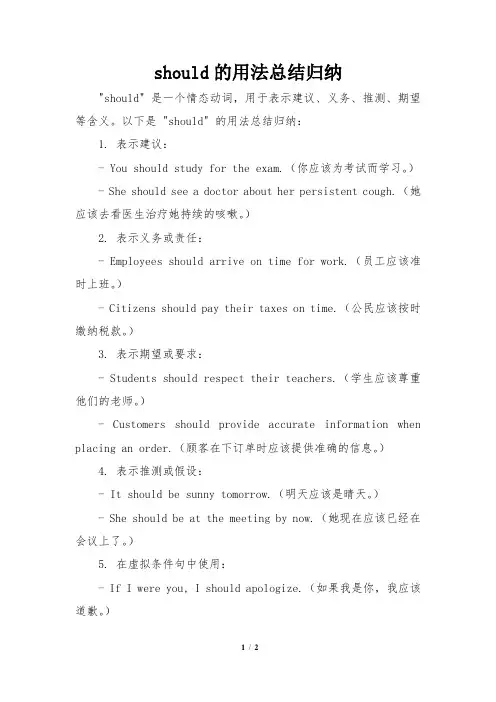
should的用法总结归纳"should" 是一个情态动词,用于表示建议、义务、推测、期望等含义。
以下是 "should" 的用法总结归纳:1. 表示建议:- You should study for the exam.(你应该为考试而学习。
)- She should see a doctor about her persistent cough.(她应该去看医生治疗她持续的咳嗽。
)2. 表示义务或责任:- Employees should arrive on time for work.(员工应该准时上班。
)- Citizens should pay their taxes on time.(公民应该按时缴纳税款。
)3. 表示期望或要求:- Students should respect their teachers.(学生应该尊重他们的老师。
)- Customers should provide accurate information when placing an order.(顾客在下订单时应该提供准确的信息。
)4. 表示推测或假设:- It should be sunny tomorrow.(明天应该是晴天。
)- She should be at the meeting by now.(她现在应该已经在会议上了。
)5. 在虚拟条件句中使用:- If I were you, I should apologize.(如果我是你,我应该道歉。
)1/ 2- He should have called, but he didn't.(他本应该打电话来的,但他没有。
)需要注意的是,"should" 是一种非常正式的用法,较为客观和礼貌。
在口语中,可以使用 "should" 的替代词如 "ought to" 或"need to"。
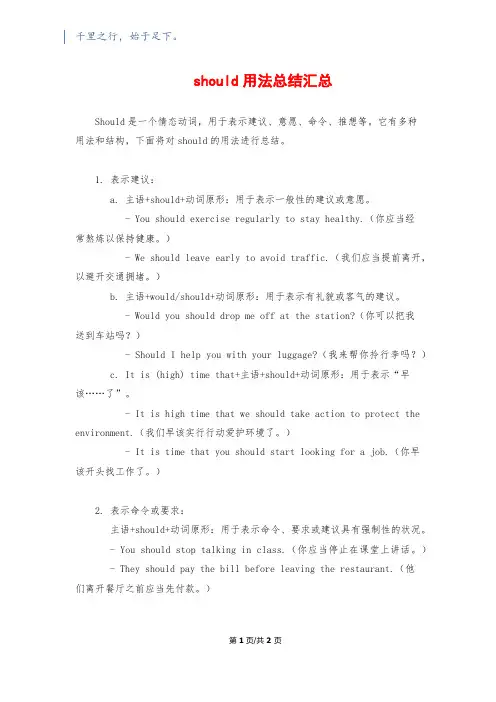
千里之行,始于足下。
should用法总结汇总Should是一个情态动词,用于表示建议、意愿、命令、推想等。
它有多种用法和结构,下面将对should的用法进行总结。
1. 表示建议:a. 主语+should+动词原形:用于表示一般性的建议或意愿。
- You should exercise regularly to stay healthy.(你应当经常熬炼以保持健康。
)- We should leave early to avoid traffic.(我们应当提前离开,以避开交通拥堵。
)b. 主语+would/should+动词原形:用于表示有礼貌或客气的建议。
- Would you should drop me off at the station?(你可以把我送到车站吗?)- Should I help you with your luggage?(我来帮你拎行李吗?)c. It is (high) time that+主语+should+动词原形:用于表示“早该……了”。
- It is high time that we should take action to protect the environment.(我们早该实行行动爱护环境了。
)- It is time that you should start looking for a job.(你早该开头找工作了。
)2. 表示命令或要求:主语+should+动词原形:用于表示命令、要求或建议具有强制性的状况。
- You should stop talking in class.(你应当停止在课堂上讲话。
) - They should pay the bill before leaving the restaurant.(他们离开餐厅之前应当先付款。
)第1页/共2页锲而不舍,金石可镂。
3. 表示推想、假设、猜想:a. 主语+should+动词原形:用于表示对某种可能性或预期结果的猜想。
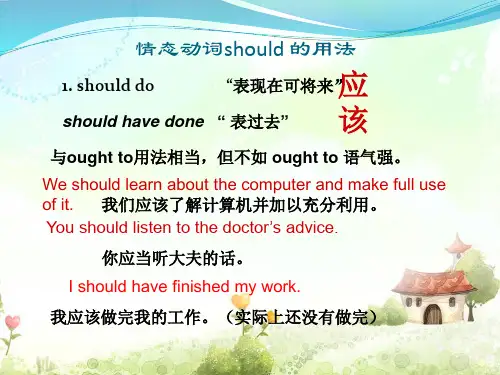
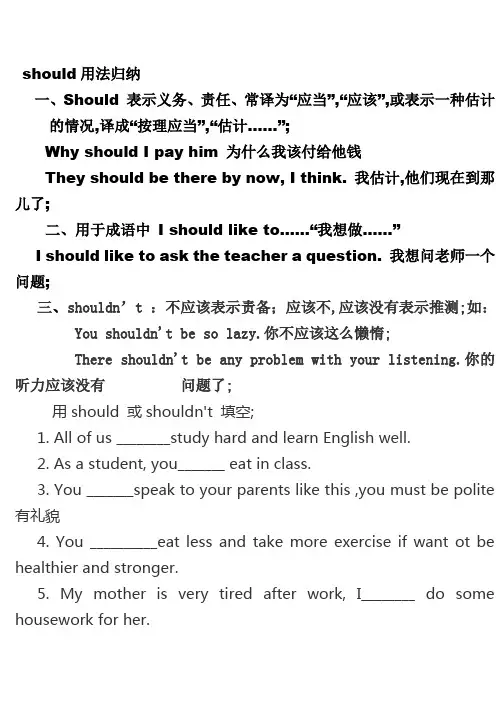
should用法归纳一、Should 表示义务、责任、常译为“应当”,“应该”,或表示一种估计的情况,译成“按理应当”,“估计......”;Why should I pay him 为什么我该付给他钱They should be there by now, I think. 我估计,他们现在到那儿了;二、用于成语中I should like to......“我想做......”I should like to ask the teacher a question. 我想问老师一个问题;三、shouldn’t :不应该表示责备;应该不,应该没有表示推测;如:You shouldn't be so lazy.你不应该这么懒惰;There shouldn't be any problem with your listening.你的听力应该没有问题了;用should 或shouldn't 填空;1. All of us ________study hard and learn English well.2. As a student, you_______ eat in class.3. You _______speak to your parents like this ,you must be polite 有礼貌4. You __________eat less and take more exercise if want ot be healthier and stronger.5. My mother is very tired after work, I________ do some housework for her.had better常简略为'd better是一固定词组,had better"最好",用于表示对别人的劝告、建议或表示一种愿望;其用法有以下几点:一、had better后面必须跟动词原形;had better后跟动词原形即不带to的不定式,构成had better do sth.句型;这里的had不能用have来替换;如:You'd better go to hospital at once.你最好立即去医院看病;Tom, you'd better go there today.汤姆,你最好今天去那儿;二、主语不论是第几人称,句子不论是什么时态,都要用had better 的形式;如:Now youhe,we had better listen to the teacher.你他,我们现在最好听老师讲;三、had better的否定式;如:常用的否定形式是将否定副词not直接放在had better的后面;如:You had better not miss the last bus.你最好不要错过末班公共汽车;You had better not leave for Nanjing the day after tomorrow.你最好后天不要动身去南京;注意:否定副词not绝不能放在had的后面;如:不能说:You hadn't better go.而应该说:You had better not go.四、在祈使句中,had有时可以省略;如:Better not do it .最好别做那事;Better not wait for them.最好不要等他们;五、had better在表示对别人劝告、建议时,不宜用于与陌生人、长辈及上级的交谈中;对长辈说话时,最好不用had better;比较有礼貌的说法是:It might be better for you...;It would be better for you...;如:It might be better for you to help me,Grandpa.爷爷,您最好能帮我一下;练习下列各句都有一处错误,请改正;'d better to wait for me at the school gate.have better write to him now.had not better go there.。
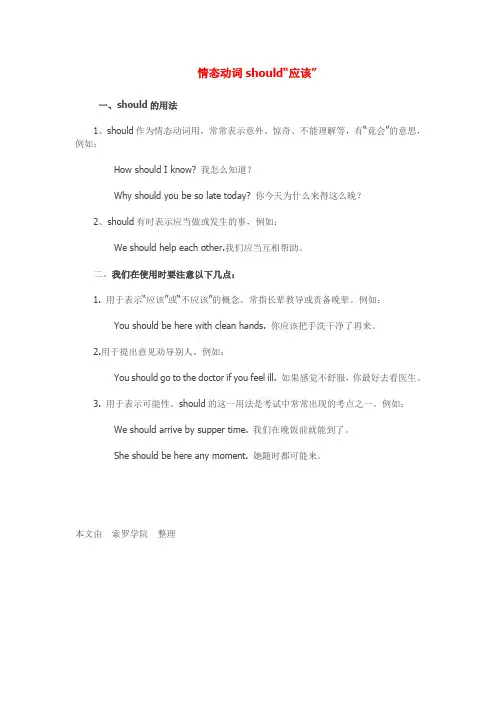
情态动词should“应该”
一、should的用法
1、should作为情态动词用,常常表示意外、惊奇、不能理解等,有“竟会”的意思,例如:
How should I know? 我怎么知道?
Why should you be so late today? 你今天为什么来得这么晚?
2、should有时表示应当做或发生的事,例如:
We should help each other.我们应当互相帮助。
二、我们在使用时要注意以下几点:
1. 用于表示“应该”或“不应该”的概念。
常指长辈教导或责备晚辈。
例如:
You should be here with clean hands. 你应该把手洗干净了再来。
2.用于提出意见劝导别人。
例如:
You should go to the doctor if you feel ill. 如果感觉不舒服,你最好去看医生。
3. 用于表示可能性。
should的这一用法是考试中常常出现的考点之一。
例如:
We should arrive by supper time. 我们在晚饭前就能到了。
She should be here any moment. 她随时都可能来。
本文由索罗学院整理。

千里之行,始于足下。
should的具体用法总结should是一个多功能的词,可以用作情态动词,也可以用作主动词。
作为情态动词,should often表示一种建议、劝告或期望。
在这种状况下,它通常用于if条件子句中或用于句子的主语之后。
1. 表示建议或劝告:- You should take a break and relax.(你应当休息一下,放松一下。
)- She should study more if she wants to pass the exam.(假如她想通过考试,她就应当多学习。
)2. 表示期望或意愿:- They should arrive on time.(他们应当准时到达。
)- He should call me tomorrow.(他应当明天给我打电话。
)3. 表示推想或假设:- She should be at home now.(她现在应当在家。
)- It should be sunny tomorrow.(明天应当是晴天。
)作为主动词,should在句子中表示某种义务、责任或必要性。
在这种状况下,should经常与动词原形连用。
1. 表示义务或责任:- You should help your parents with the housework.(你应当挂念父母做家务。
)- We should take care of the environment.(我们应当爱护环境。
)第1页/共2页锲而不舍,金石可镂。
2. 表示必要性或必定性:- We should eat healthy food for a better lifestyle.(我们应当健康饮食,以获得更好的生活方式。
)- You should pay attention to your grammar when writing.(写作时应留意语法。
)除了上述用法外,should还有其他一些常见的搭配:1. Should have + 过去分词:表示对过去某个行动的建议、绝望或懊悔。
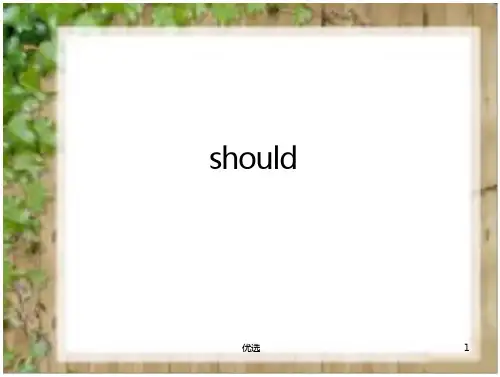
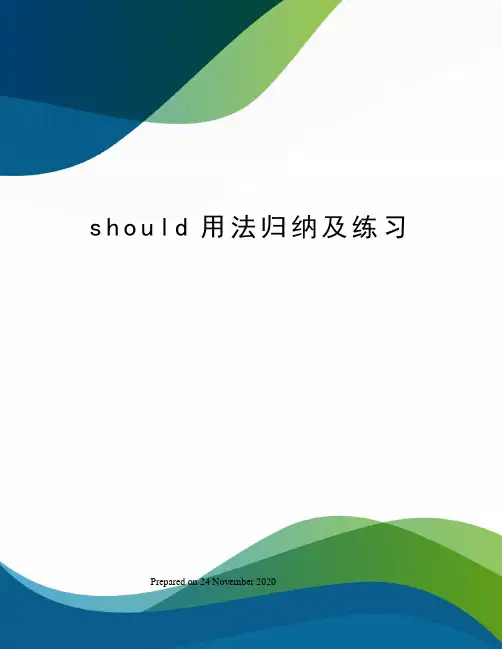
s h o u l d用法归纳及练习 Prepared on 24 November 2020should用法归纳及练习一、Should 表示过去将来时,即从过去观点看将来要发生的事,多用于间接引语中。
We thought that we should never see you again. 我们想我们再也看不到你了。
The BBC weather report this morning said that we should have rain.今天早上,BBC电台天气报告说,今天有雨。
二、Should 表示义务、责任、常译为“应当”,“应该”,或表示一种估计的情况,译成“按理应当”,“估计......”。
Why should I pay him 为什么我该付给他钱They should be there by now, I think. 我估计,他们现在到那儿了。
Should 用于完成时态,表示对过去发生的动作的一种推测,译成“应该已经......”。
You should have washed the wood. (But you haven‘t.) 你应该把伤口清洗了。
(然而你没有)三、在某些从句中,should 表示惊异、意外等情绪,常译为“竟然”。
It seems unfair that this should happen to me.真不公平,这件事竟然发生在我身上。
四、当陈述部分含有ought to ,其反意疑问句部分,美国英语中用should .She ought to stay here, shouldn't her她该留在这儿,是吗五、用于成语中I should like to......“我想(做)......”I should like to ask the teacher a question. 我想问老师一个问题。
六、"should (not) +have+过去分词(done)" 对已发生的事表示遗憾或责备,表达"本该或不该"之意。
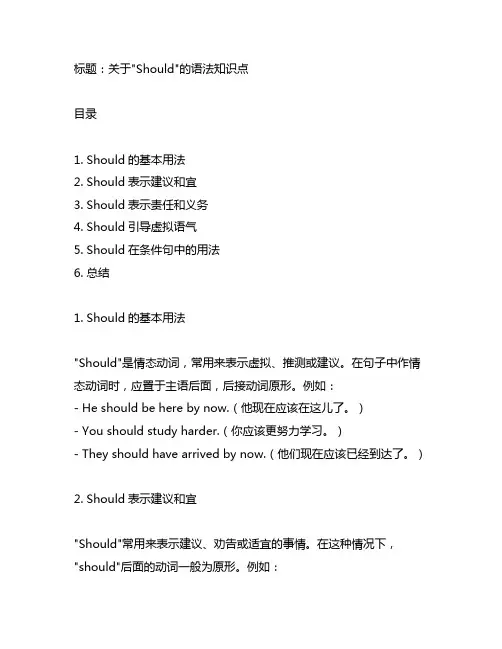
标题:关于"Should"的语法知识点目录1. Should的基本用法2. Should表示建议和宜3. Should表示责任和义务4. Should引导虚拟语气5. Should在条件句中的用法6. 总结1. Should的基本用法"Should"是情态动词,常用来表示虚拟、推测或建议。
在句子中作情态动词时,应置于主语后面,后接动词原形。
例如:- He should be here by now.(他现在应该在这儿了。
)- You should study harder.(你应该更努力学习。
)- They should have arrived by now.(他们现在应该已经到达了。
)2. Should表示建议和宜"Should"常用来表示建议、劝告或适宜的事情。
在这种情况下,"should"后面的动词一般为原形。
例如:- You should take a break.(你应该休息一下。
)- We should start early.(我们应该早点开始。
)- She should see a doctor.(她应该去看医生。
)3. Should表示责任和义务"Should"也可以表示责任和义务,通常用于表示某种道德上的义务或应尽的责任。
例如:- You should apologize for your mistake.(你应该为自己的错误道歉。
)- We should help those in need.(我们应该帮助有需要的人。
)- She should have returned the money.(她本应该把钱退还。
)4. Should引导虚拟语气在虚拟语气中,"should"常用来表示主观的推测或建议。
在这种情况下,"should"后面的动词一般为原形。
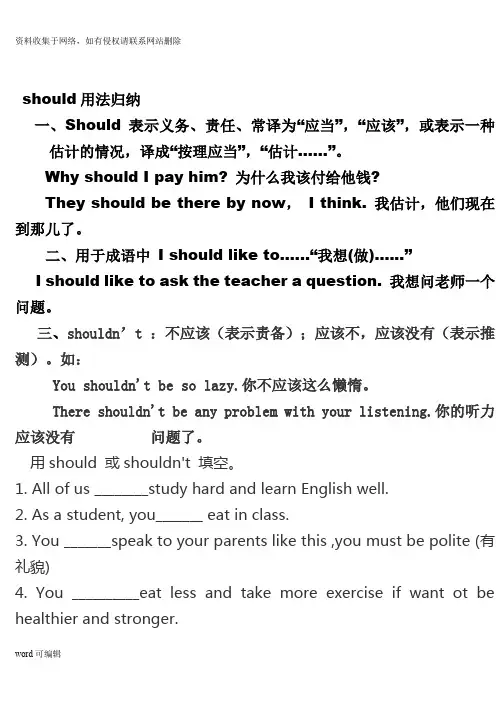
should用法归纳一、Should 表示义务、责任、常译为“应当”,“应该”,或表示一种估计的情况,译成“按理应当”,“估计......”。
Why should I pay him? 为什么我该付给他钱?They should be there by now,I think. 我估计,他们现在到那儿了。
二、用于成语中I should like to......“我想(做)......”I should like to ask the teacher a question. 我想问老师一个问题。
三、shouldn’t :不应该(表示责备);应该不,应该没有(表示推测)。
如:You shouldn't be so lazy.你不应该这么懒惰。
There shouldn't be any problem with your listening.你的听力应该没有问题了。
用should 或shouldn't 填空。
1. All of us ________study hard and learn English well.2. As a student, you_______ eat in class.3. You _______speak to your parents like this ,you must be polite (有礼貌)4. You __________eat less and take more exercise if want ot be healthier and stronger.5. My mother is very tired after work, I________ do some housework for her.had better(常简略为'd better)是一固定词组,had better"最好",用于表示对别人的劝告、建议或表示一种愿望。
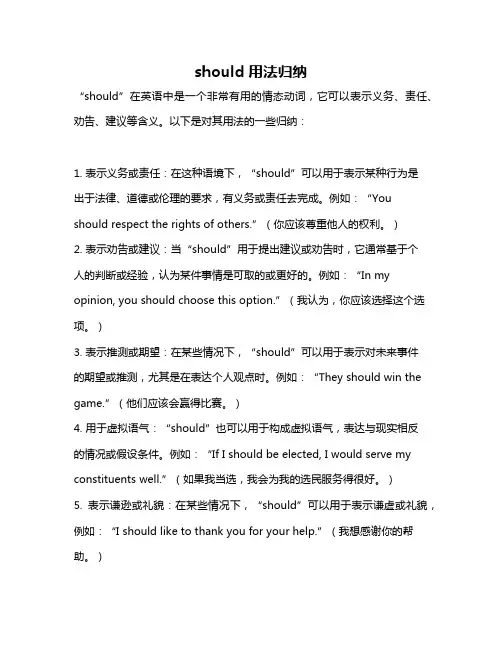
should用法归纳“should”在英语中是一个非常有用的情态动词,它可以表示义务、责任、劝告、建议等含义。
以下是对其用法的一些归纳:1. 表示义务或责任:在这种语境下,“should”可以用于表示某种行为是出于法律、道德或伦理的要求,有义务或责任去完成。
例如:“You should respect the rights of others.”(你应该尊重他人的权利。
)2. 表示劝告或建议:当“should”用于提出建议或劝告时,它通常基于个人的判断或经验,认为某件事情是可取的或更好的。
例如:“In my opinion, you should choose this option.”(我认为,你应该选择这个选项。
)3. 表示推测或期望:在某些情况下,“should”可以用于表示对未来事件的期望或推测,尤其是在表达个人观点时。
例如:“They should win the game.”(他们应该会赢得比赛。
)4. 用于虚拟语气:“should”也可以用于构成虚拟语气,表达与现实相反的情况或假设条件。
例如:“If I should be elected, I would serve my constituents well.”(如果我当选,我会为我的选民服务得很好。
)5. 表示谦逊或礼貌:在某些情况下,“should”可以用于表示谦虚或礼貌,例如:“I should like to thank you for your help.”(我想感谢你的帮助。
)总的来说,“should”是一个非常灵活的词语,其用法取决于具体的语境和说话者的意图。
正确地使用“should”可以帮助我们更准确地表达自己的想法,同时也能更好地理解别人的意思。
should的五个一般用法一、Should表示义务、责任、劝告、建议,其同义词是ought to;在疑问句中,通常用should代替ought to.例如:You should go to class right away.你应该马上去上课。
Should I open the window?我能打开窗户吗?二、Should的含义较多,用法较活,现介绍三种其特殊用法。
请看下面的句子:1.I should think it would be better to try it again.我倒是认为最好再试一试。
2.You are mistaken,I should say.依我看,你是搞错了。
3.I should advise you not to do that.我倒是劝你别这样做。
4.This is something I should have liked to ask you.这是我本来想问你的。
从以上例句可以看出:情态动词should用于第一人称时可以表示说话人的一种谦逊、客气、委婉的语气。
三、Should还可以用在if引导的条件从句,表示一件事听起来可能性很小,但也不是完全没有可能。
相当于“万一”的意思。
从句谓语由should加动词原形构成,主句谓语却不一定用虚拟语气。
如:1.Ask her to ring me up if you should see her.你万一见到她,请让她给我打个电话。
2.If you should change your mind,please let us know.万一你改变主意,请通知我们。
3.Should I(If I should)be free tomorrow I will come.万一我明天有时间,我就来。
四、此外,Why(or How)+should结构表示说话人对某事不能理解,感到意外、惊异等意思。
意为“竟会”。
如:1.Why should you be so late today?你几天怎么来得这么晚?2.—Where is Betty living?—贝蒂住在哪里?—How should I know?—我怎么会知道呢?3.I don't know why you should think that I did it.我真不知道你凭什么认为这件事是我干的。
s h o u l d用法归纳及练习一、Should 表示过去将来时,即从过去观点看将来要发生的事,多用于间接引语中。
We thought that we should never see you again. 我们想我们再也看不到你了。
The BBC weather report this morning said that we should have rain.今天早上,BBC电台天气报告说,今天有雨。
二、Should 表示义务、责任、常译为“应当”,“应该”,或表示一种估计的情况,译成“按理应当”,“估计......”。
Why should I pay him? 为什么我该付给他钱?They should be there by now,I think. 我估计,他们现在到那儿了。
Should 用于完成时态,表示对过去发生的动作的一种推测,译成“应该已经......”。
You should have washed the wood. (But you haven‘t.) 你应该把伤口清洗了。
(然而你没有)三、在某些从句中,should 表示惊异、意外等情绪,常译为“竟然”。
It seems unfair that this should happen to me.真不公平,这件事竟然发生在我身上。
四、当陈述部分含有ought to ,其反意疑问句部分,美国英语中用should .She ought to stay here,shouldn't her?她该留在这儿,是吗?五、用于成语中I should like to......“我想(做)......”I should like to ask the teacher a question. 我想问老师一个问题。
六、"should (not) +have+过去分词(done)" 对已发生的事表示遗憾或责备,表达"本该或不该"之意。
初二英语语法知识点should的用法整理初二英语语法知识点should的用法整理(一)should的用法:should用来提出建议和忠告,后边加动词原形,否定句直接在should后边加not.例如:Ithinkyoushouldeatlessjunkfood.我认为你应该少吃垃圾食品。
Shedrivesalotandsheseldomwalks.SoIthinksheshouldwalkalo t.她经常开车,很少走路。
所以我认为她应该多走路。
Studentsshouldn’tspendtoomuchtimeplayingcomputerga mes.学生们不应当花太多的.时间玩计算机游戏。
学习向别人提建议的几种句式:(1)Ithinkyoushould…(2)Well,youcould…(3)Maybeyoushould…(4)Whydon’tyou…?(5)Whataboutdoingsth.?(6)You’dbetterdosth.练一练用should或shouldn’t填空1.Ican’tsleepthenightbeforeexams.You______takeawarmshowerbeforeyougotobed.2.Goodfriends______argueeachother.3.Thereislittlemilkintheglass.We_______buysome.4.Theydidn’tinviteyou?Maybeyou______befriendlier.5.Iamalittlebitoverweight.SoIthinkI_______doexerciseseveryd ay.答案:1.should2.shouldn’t3.should4.should5.should希望大家能够认真阅读这篇初二英语语法知识点should的用法讲解,以便在英语学习上取得优异的成绩。
s h o u l d用法归纳及练
习
should用法归纳及练习
一、Should 表示过去将来时,即从过去观点看将来要发生的事,多用于间接引语中。
We thought that we should never see you again. 我们想我们再也看不到你了。
The BBC weather report this morning said that we should have rain.
今天早上,BBC电台天气报告说,今天有雨。
二、Should 表示义务、责任、常译为“应当”,“应该”,或表示一种估计的情况,译成“按理应当”,“估计......”。
Why should I pay him? 为什么我该付给他钱?
They should be there by now, I think. 我估计,他们现在到那儿了。
Should 用于完成时态,表示对过去发生的动作的一种推测,译成“应该已经......”。
You should have washed the wood. (But you haven‘t.) 你应该把伤口清洗了。
(然而你没有)
三、在某些从句中,should 表示惊异、意外等情绪,常译为“竟然”。
It seems unfair that this should happen to me.真不公平,这件事竟然发生在我身上。
四、当陈述部分含有ought to ,其反意疑问句部分,美国英语中用should .
She ought to stay here, shouldn't her?她该留在这儿,是吗?
五、用于成语中I should like to......“我想(做)......”
I should like to ask the teacher a question. 我想问老师一个问题。
六、"should (not) +have+过去分词(done)" 对已发生的事表示遗憾或责备,表达"本该或不该"之意。
如:①He also learns that he should have cared more about his friends.他还明白了他本应该多关心朋友。
②He shouldn't have let out the secret.他本不该泄露秘密的。
(实际情况是"他已泄密"。
)
翻译:①If he were here, 如果他(现在)在这里的话,我就会告诉他真相。
(事实是,他现在不在这里。
)
②If I had been here yesterday, 如果昨天我在这里,我就会好好教训他一顿。
(事实是:我没教训他,因为我昨天没在这里。
teach sb. a good lesson教训某人)
③如果没有你的帮助,我就赢不了。
(事实是我已经获胜。
)
1.I was really anxious about you. You _______ home without a word.(NMET)
A.mustn't leave
B.shouldn't have left
C.needn't leave
D.couldn't have left
2.I'm not feeling well in the stomach, I _______ so much fried chicken just now.(上海)
A.shouldn't eat
B.mustn't have eaten
C.mustn't eat
D.shouldn't have eaten
3.We _______ last night, but we went to the concert instead.(NMET)
A.must have studied
B.might study
C.should have studied
D.would study
4.I told Sally how to get here, but perhaps I _______ it out for her.(NMET)
A.had to write
B.must have written
C.should have written
D.ought to write
5.That young man has made so much noise that he _______ not have been allowed to attend the concert.(上海)
A.could
B.must
C.would
D.should
6.It's nearly seven o'clock. Jack _______ be here at any moment.(NMET)
A.must
B.need
C.should
D.can
7.-When can I come for the photos? I need them tomorrow afternoon.
-They _______ be ready by 12:00.(NMET)
A.can
B.should
C.might
D.need
8.Mary _______ be in Paris, for I saw her in the town a few minutes ago.(NMET)
A.mustn't
B.can't
C.shouldn't
D.may not
9.I didn't see her in the meeting room this morning. She _______ have spoken at the meeting.(MET)
A.mustn't
B.shouldn't
C.needn't
D.couldn't
10.-There were already five people in the car,but they managed to take me as well.
-It _______ a comfortable journey.(NMET)
A.can't be
B.mustn't have been
C.shouldn't
D.couldn't have been
11.If only he _______ quietly as the doctor instructed, he would not suffer so much now.(上海)
A.lies
y
C.had lain
D.should lie
12.It's hard for me to imagine what I would be doing today if I _______ in love, at the age of seven, with the Melinda Cox Library in my hometown.(上海)
A.wouldn't have fallen
B.had not fallen
C.should fall
D.were to fall
13.Johnny, you _______ play with the knife, you _______ hurt yourself.(NMET 1996)
A.won't; can't
B.mustn't; may
C.shouldn't; must
D.can't; shouldn't
14.-Are you coming to Jeff's party?
-I'm not sure. I _______ go to the concert instead.(NMET 2000)
A.must
B.would
C.should
D.might
15.A left-luggage office is a place where bags _______ be left for a short time, especially at a railway station.(NMET 2003)
A.should
B.can
C.must
D.will。